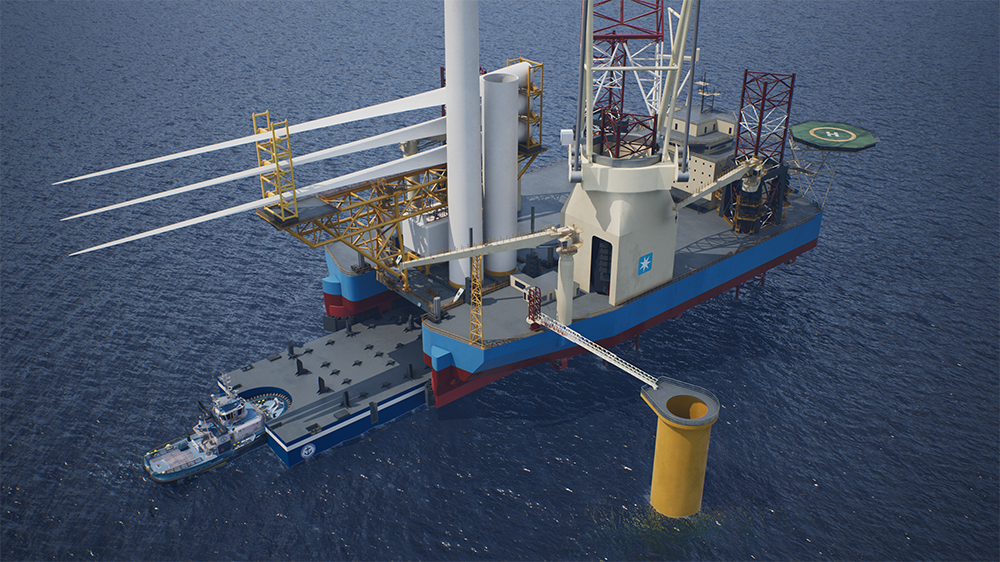POWERING THE ENERGY ADDITION:
BAYOU REGION AT THE FOREFRONT

Louisiana’s Bayou Region (www.bayouregion.com) has long been synonymous with energy production, particularly in the realm of oil and gas. However, as the world embraces a more diverse energy portfolio, the region is heralding a new era – the Energy Addition. This term underscores the significance of incorporating new energy sources alongside the existing oil and gas industries, amplifying rather than replacing them.
In this transformative period, companies like Edison Chouest Offshore (ECO) and Bollinger Shipyards are leading the charge, exemplifying the region’s commitment to innovation and adaptation.
Forging Ahead: A New Era in Energy
The recent announcement of a partnership between Maersk Supply Service and ECO marks a significant milestone in the journey towards a more diversified energy landscape. Maersk Supply Service, renowned for its offshore marine services, is teaming up with ECO to construct and operate a windfarm feeder concept tailored for Maersk’s next-generation Wind Installation Vessel. This innovative endeavor aims to expedite the rollout of offshore wind farms, with estimated efficiency gains of up to 30%.
“This partnership facilitates expansion of our existing footprint in the U.S. offshore wind industry,” remarks Mr. Dino Chouest, Executive Vice President of ECO. “Our decades of offshore experience, efficiency, and focus on technology can play an important role in the further development of the U.S. offshore wind segment.”
Building the Future: Local Expertise in Action
At the core of this initiative lies the construction of purpose-built feeder spread, encompassing tugs and barges, by Bollinger Shipyards. As the largest privately-owned shipyard group in the United States, Bollinger Shipyards epitomizes the Bayou Region’s manufacturing prowess and maritime engineering expertise. This endeavor is poised to enhance the region’s capabilities in facilitating the transportation of wind turbine components, thereby expediting the installation process and reducing reliance on weather conditions. Consequently, offshore wind parks can be operational more efficiently, fortifying the region’s energy portfolio and stimulating economic growth.
“The Energy Addition is what truly defines our region’s forward momentum in the energy sector. Here in the Bayou, we’ve been leaders in offshore energy development, and this announcement further cements our role as invaluable. Our region’s depth of expertise and capability extends beyond the Gulf of Mexico to the East and West Coasts, showcasing our significant contributions to offshore energy development. This is not just about maintaining our position; it’s about leveraging our unparalleled knowledge and skills to shape the future of energy on a national scale,” says Chet Chiasson, Executive Director of Port Fourchon.
Leadership in Our Energy Future: SLEC’s Vision
Vic Lafont, President/CEO of SLEC, emphasizes the resilience and quality of work produced by Bayou Region businesses in the energy sector. “The Bayou Region has a rich history of adapting to changing energy landscapes,” Lafont states. “Our companies have consistently demonstrated their ability to innovate and excel, driving the region’s economic prosperity.”
Lori LeBlanc, SLEC Consultant and Emerging Energies Task Force leader, underscores the pivotal moment we are in regarding new energy opportunities. “The Bayou Region is uniquely positioned to lead in emerging energy technologies and renewable energy,” LeBlanc affirms. “With our skilled workforce, strategic infrastructure, and commitment to innovation, we are poised to harness the full potential of this Energy Addition.”
Charting a Sustainable Future
As the Bayou Region embraces the Energy Addition, partnerships like the one between Maersk Supply Service, ECO, and Bollinger Shipyards exemplify the collaborative spirit and forward-thinking mindset that define the region’s approach to energy diversification. With innovation, resilience, and determination as guiding principles, the Bayou Region is charting a course towards a sustainable and prosperous future. This transition not only ensures the region’s continued relevance in the energy landscape but also serves as a model for other communities navigating similar transformations. By embracing change and leveraging local expertise, the Bayou Region is poised to remain a powerhouse in the energy sector for generations to come.

